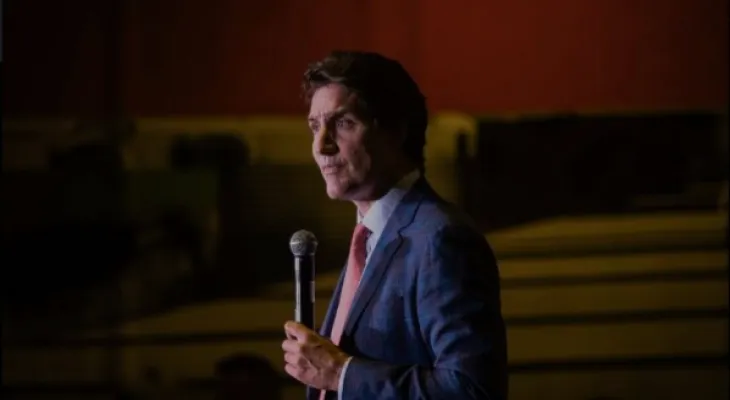Search here
Newspaper
Search here

Arab Canada News
News

Published: September 3, 2023
Canada is setting its sights on Asia and the lucrative trade markets in the Indian and Pacific Oceans, as Prime Minister Justin Trudeau heads to the region for a week of international summits and bilateral meetings.
With stops in Indonesia, Singapore, and India over six days, building relationships with Asian leaders is a critically important goal.
Canada seeks to achieve rapid growth in the region amid the global shift towards green energy, in which Canada sees itself as a key player.
It also wants to diversify its trade in the region away from China, having launched a new strategy for the Indian and Pacific Oceans last fall aimed at expanding trade links throughout the region to help counter China's dominance.
It is currently negotiating a comprehensive trade agreement with Indonesia and has temporarily paused formal trade talks with India pending further consultations with trade stakeholders.
It has already signed a trade agreement with Singapore, as both are signatories to the Comprehensive and Progressive Agreement for Trans-Pacific Partnership, commonly referred to as CPTPP.
Experts warn that Trudeau will need to avoid over-preaching during his trip and demonstrate that his visit is not just a photo opportunity but part of a larger commitment that Canada will be in the region long-term.
For his part, Goldy Hyder, president of the Canadian Business Council, said: "Relationships, relationships, relationships." "This is not a place where you just come and say, 'Hi, I'm here to do business. Let's make a deal.' This is a place where you grow relationships. We need to understand each other's cultures."
Hyder added that the priority should be on trade and the economy.
Trudeau's first stop will be in Jakarta on September 4, where he will meet Indonesian President Joko Widodo and attend the Association of Southeast Asian Nations (ASEAN), a group of 10 countries representing the fourth-largest trading partner for Canada.
On September 6, he will travel to Singapore and spend two days meeting with Prime Minister Lee Hsien Loong and business leaders. He will conclude his tour with a two-day visit to New Delhi, India, to attend the G20 Leaders' Summit.
While advocacy groups from Western countries urge raising human rights issues throughout the G20 Summit, some experts say Canada will benefit more by focusing on the economy.
Basma Momeni, a political science professor at the University of Waterloo, said: "It won't find an attentive ear." She added: "There is a strong sentiment in the Indo-Pacific region that you need us more than we need you, so stop preaching to us. This is not the same environment that existed 10 years ago when Trudeau could go to these places and be on his high horse."
She continued that Asian leaders also criticized Canada's presence in the region as being too incidental.
The Indo-Pacific region is the fastest-growing area in the world and will play a critical role in shaping Canada's future over the next fifty years.
By 2030, it will be home to two-thirds of the global middle class, having lifted millions out of poverty through its economic growth. Hyder stated that population growth is the labor force that Canada needs, especially with an aging population.
Climate change is also essential to Canada's prospects in the region, as Ottawa sees itself as a leader in transitioning the area to green energy. Canadian companies believe they have the fuel, food, and fertilizers to help meet this challenge.
Government officials noted a willingness among ASEAN countries to manufacture cleaner products as they are concerned about being excluded from future investments if they rely on dirty energy for manufacturing.
Regarding the G20, John Kirton, a political science professor at the University of Toronto, said that climate change often presents a gray and divisive cloud, although it has become a more clear and present danger.
However, Kirton, who leads the G20 Research Group, stated that if Canada can find a way to move away from fossil fuels, then others can do it too.
This trip marks Trudeau's first return to India since his controversial trip in 2018, which international media described as an embarrassing disaster.
While provincial and state governments in India have warmly welcomed Trudeau, Prime Minister Narendra Modi appeared to completely ignore Trudeau's presence until the final days of the ten-day visit. Many believe Modi's behavior was a deliberate attempt to embarrass Trudeau in response to what India sees as a lackluster effort by Canada to curb the separatist Sikh movement in Canada.
This time, Trudeau kept his trip brief, spending only two days in New Delhi to attend G20 Leaders' meetings. He will focus on climate change, food and energy security, and gender equality at that meeting.
He is also expected to advocate for Ukraine, which has not been invited to the G20 Leaders' Summit. Russian President Vladimir Putin will also not attend the summit, but will instead send his foreign minister.
Sanjay Kumar Verma, the Indian High Commissioner in Ottawa, stated, "What he wants to talk about is entirely his right. I am sure that anything he says... will carry significance, and people will talk about it."
Comments